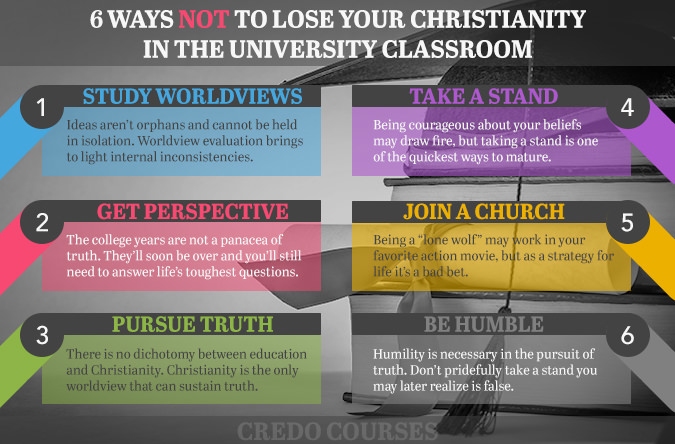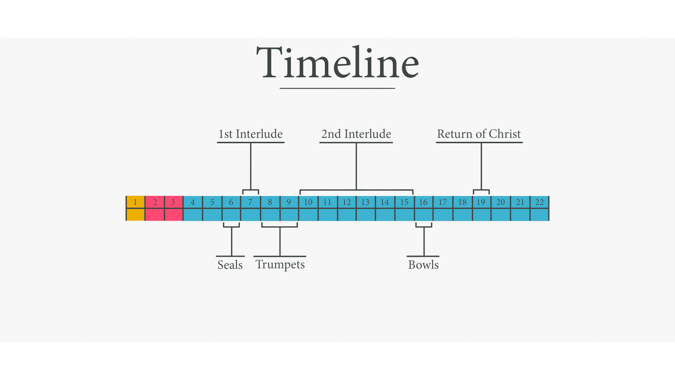
This blog post is a duplication (as much as possible) of the workbook materials for the first session in Dr. Mark Hitchcock’s course on Revelation. Each Credo Course has a workbook to accompany it. The workbook we’ve created for Revelation is our most exhaustive and thorough ever. Each session (as you’ll see in the blog post below) also has a series of questions at the end. These are especially helpful for use in small groups and classroom type settings.
This blog post is the contents of the workbook for the first session of the Credo Course on Revelation. You can purchase the entire course as a digital download, on DVD, etc.
Two Caveats
- Dimensions: The workbook (both print and pdf) has been designed for a 6×9 page spread. This means that the content in this blog post is more spread out than it is in the workbook.
- Use Cases: The workbook is designed to be used valium europe online in conjunction with the lecture for each respective session. But it is not a transcript. Therefore, you’ll be more benefited by using the two of them together.
Introduction to Revelation
Broad Course Outline
- Introduction
- Main issues
- Problem passages
Test: Are You Obsessed with Bible Prophecy?
- You always leave the top down in your convertible in case the rapture happens.
- You never buy green bananas.
- You talked your church into adopting the 60’s pop song “Up, Up, and Away” as a Christian hymn.
- Barcode scanners make you nervous.
- You refuse a tax refund check because the total comes to $666.
- You can name more signs of the times than you can commandments.
- You believe there’s an original Greek and Hebrew text with Scofield’s notes.
- You believe the term “church fathers” refers to Hal Lindsey and Tim LaHaye.
- You get goosebumps when you hear a trumpet.
- You use the Left Behind books as devotional reading.
Importance of Studying Revelation
We study prophecy because we love the Bible and want to understand it. Almost 30% of the Bible was prophetic at the time it was written, so if we love the Bible, we love prophecy.
The book of Revelation, as the capstone of God’s message to us, really helps us to put the Bible together.
Title
Revelation 1:1a
The Revelation of Jesus Christ, which God gave Him to show to His bond-servants
The proper title for this book is The Revelation of Jesus Christ. This could mean one of two things:
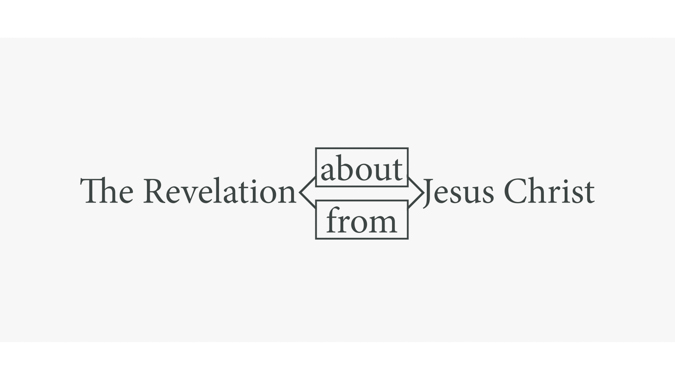
Revelation is certainly about Jesus; there are at least thirty-five names and titles of Jesus in Revelation. However, the rest of the verse would seem to indicate that the correct meaning is “The Revelation from Jesus Christ.” The emphasis is on Jesus as the Revealer more than on Jesus the Revealed One.
Three Ways the Title Is Misunderstood
- Revelations (the plural form of Revelation)
- The Revelation of St. John
- The Revelation of St. John the Divine
Revelation’s Place in History
- It looks ahead.
- It looks behind.
First of all, I believe that the Book of Revelation is a “Grand Central Station” into which all future Bible Prophecy flows.[1]
–Dr. Thomas Ice
Highlights
- There are 278 allusions to the OT in the 404 verses of Revelation.
- There are no direct quotes from the OT in Revelation.
- Revelation is the only prophetic book in the NT.
- It gives the proper view, God’s view, of history.
- It has the highest Christology in the NT.
- It has an elaborate doctrine of Satan, demons, and the Antichrist.
- It predicts a final, totalitarian, global, one-world, urban empire.
Definition
Revelation ἀποκάλυψις [ap·ok·al·oop·sis]
To cause something to be fully known—‘to reveal, to disclose, to make fully known, revelation.’[2]
Form
The book of Revelation is a prophecy in the form of an epistle that contains apocalyptic imagery.
- An apocalypse (1:1)
- A prophecy (1:3, 22:10)
- A letter or epistle (2, 3)
Keywords
The word “and” takes us breathlessly through the book.
- And = 1,200
- Great = 82
- Seven = 54
- Throne = 46
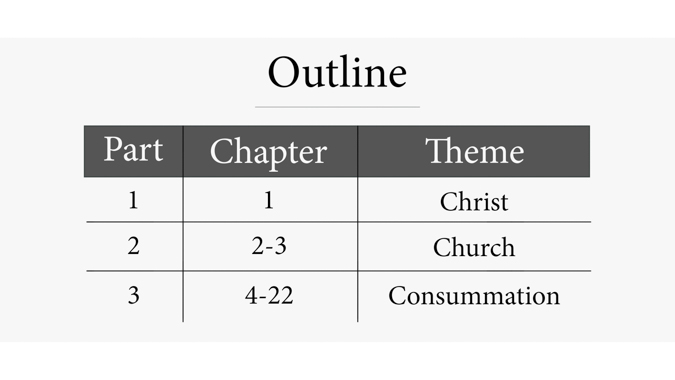
Key Verse
Revelation 1:7
Behold, he is coming with the clouds, and every eye will see him, even those who pierced him, and all tribes of the earth will wail on account of him. Even so. Amen.
Theme
The ultimate triumph of Jesus Christ
Historical Background of Revelation
Revelation is written to seven literal churches in Asia Minor (the western part of modern day Turkey).

External
Domitian (51–96 A.D.) was the Roman ruler (or Caesar) when John wrote Revelation. He wanted to be worshiped as God.
Titus Flavius Caesar Domitianus Augustus was Roman emperor from 81 to 96 A.D.
Domitian was the third and last emperor of the Flavian dynasty.
There was local, intermittent persecution of believers.
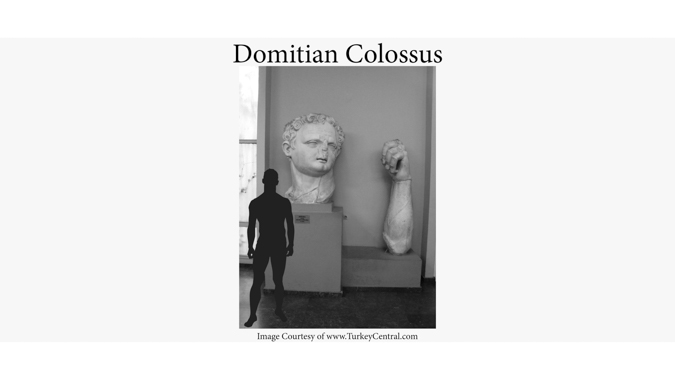
Internal
Apathy was developing inside the churches; some of them had left their first love or were lukewarm.
Apostasy had also begun to creep in, as was the case with the church at Pergamum and Thyatira.
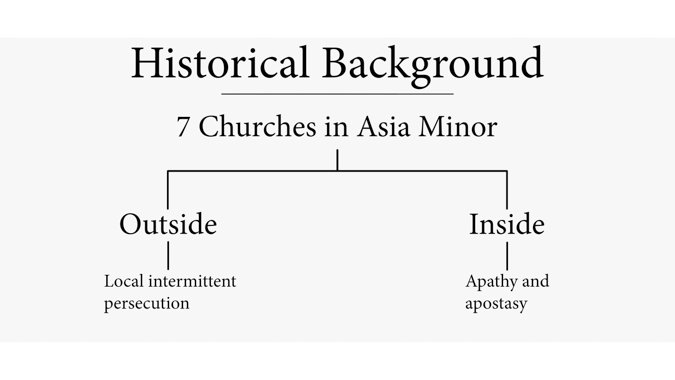
Argument of Revelation
We should develop the argument, flow, or purpose of a book, then trace that throughout the entire book. We can then trace the other elements within the book, and relate them back to the purpose.
If we don’t have a purpose in mind when studying the Bible, we can easily get lost.
Purpose Statement
To give believers the advanced history of how Jesus Christ, through judgment, becomes King, with a view towards calling them to faithfulness and to godliness.
Judgment Whereby Jesus Becomes King
- Seal judgments (6)
- Trumpet judgments (8–9)
- Bowl judgments (16)
Two Patterns to Aid Understanding
- Alternating perspectives: between heaven and earth
- Alternating pacing: between action and interludes (The chronology of Revelation flows in the seals, trumpets, and bowls with interludes that fill in additional details.)
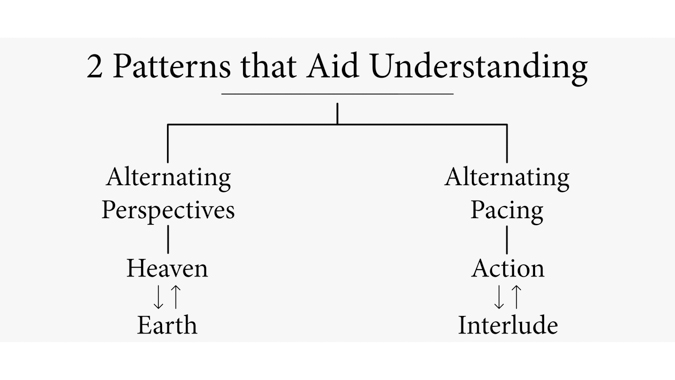
This could be likened to a telephone conversation. Revelation chapter 6 starts telling the story, but there is an interruption to fill in some details in chapter 7. The order then resumes in chapters 8–9, followed by more fill in, in chapters 10–15. The progression returns in chapter 16 with more fill in, in chapter 17–18, followed by the second coming in chapter 19.
Sometimes the interludes run ahead (chapter 14) and give information about what is to come, but most of the time they back up and emphasize what has been happening while the judgments are being poured out.

My Beliefs
As you begin your journey through this course, take some time to record your current beliefs/questions about eschatology. This is a helpful way to track your growth.
- My beliefs about the millennium (Amillennial, Postmillennial, Premillennial, Other)
- My beliefs about timing of overall fulfillment (Preterist, Historicist, Idealist, Futurist, Eclectic, Other)
- My beliefs about the rapture (Pre-trib, Post-trib, Mid-trib, Other)
- My additional thoughts about Revelation
My Questions
Throughout this course, we encourage you to make full use of the mar- gins and blank pages to ask yourself questions, and make notes of things that are meaningful to you.
- My questions about the millennium (Amillennial, Postmillennial, Premillennial, Other)
- My questions about timing of overall fulfillment (Preterist, Historicist, Idealist, Futurist, Eclectic, Other)
- My questions about the rapture (Pre-trib, Post-trib, Mid-trib, Other)
- My additional questions about Revelation
Questions
- What is your goal in this study?
- How should we approach any study of God’s Word?
- Why should we study Revelation?
- Why do you believe Revelation was written? Write your own purpose statement for Revelation.
- Who was the Roman emperor when John wrote Revelation?
- What is the correct title of Revelation?
- Revelations
- The Revelation of St. John
- The Revelation of Jesus Christ
- What is the form of Revelation?
- What is the theme of Revelation?
- Copy and memorize the key verse of Revelation.
- Number these judgments in the order in which they occur.
- _____ Trumpets
- _____ Bowls
- _____ Seals
- Which chapter(s) fit into which categories?
- _____ Past
- _____ Present
- _____ Prophetic
- Thomas Ice. “Babylon In Bible Prophecy” Pre-Trib Research Center. http://www.pre-trib.org/data/pdf/Ice-BabylonInBibleProphec.pdf Web 27 September, 2014 ↩
- Johannes P. Louw, and Eugene Albert Nida. Greek-English Lexicon of the New Testament: Based on Semantic Domains 1996 : 338. Print. ↩

